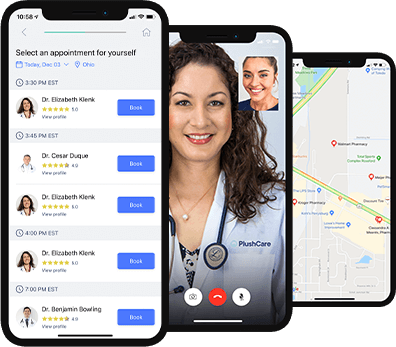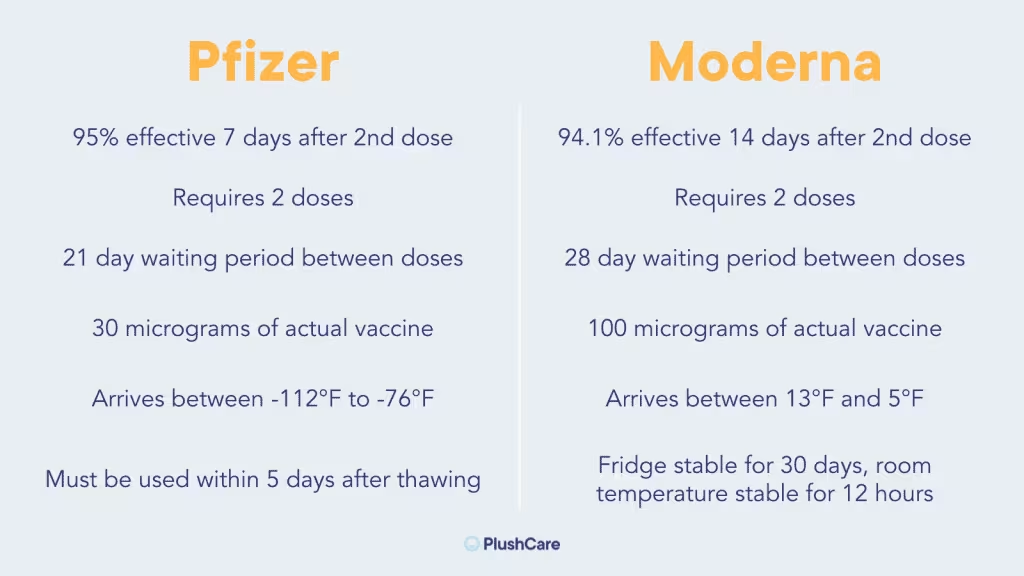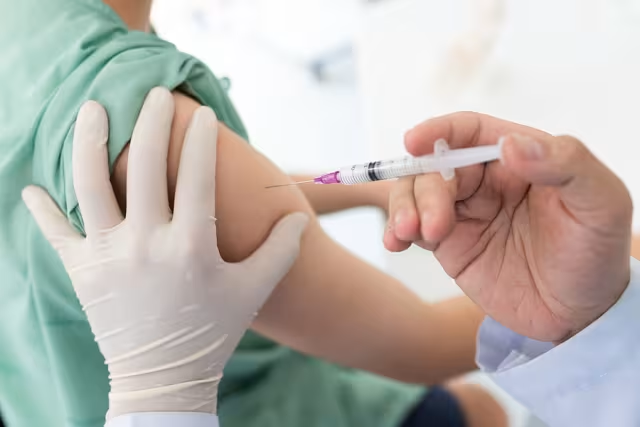*NOTE: Due to a lack of scientific data at this time, PlushCare physicians do not prescribe ivermectin, hydroxychloroquine, or azithromycin/other antibiotics to treat COVID-19.
Can I Choose Between the Pfizer and the Moderna Vaccine?
You may be wondering, “Can I choose which vaccine to get?” The answer is yes. Vaccines are much more accessible in the U.S. than just a few months ago. Today, anyone who wants to be vaccinated can be. Although there are some differences across the three vaccines we review here, they all provide a very high level of protection against COVID-19, including the new Delta variant
The Pfizer and Moderna COVID-19 vaccines were both approved by the FDA for emergency use in December 2020, while the Johnson & Johnson vaccine was approved in February 2021.
Pfizer
The FDA fully approved the Pfizer-BioNTech COVID-19 vaccine on August 23, 2021. As the first FDA-approved COVID-19 vaccine, this marked a major milestone in fighting the pandemic. The FDA’s approval of the vaccine’s safety and quality should provide confidence in getting vaccinated.
The initial rollout of the vaccine worked in phases, with healthcare workers, essential workers, the elderly, and other high-risk populations receiving the first doses produced.
Today, the Pfizer-BioNTech vaccine is approved for anyone 5 or older. As of October 29, 2021, the FDA authorized a child dose of the vaccine for emergency use in children aged 5-11. Two doses of the vaccine were tested in 3,100 children aged 5-11, and no serious side effects were found. The vaccine for children contains one third of the adult dose of the vaccine, produces a strong immune response in children, and proved to be almost 91% effective in preventing COVID-19.
Moderna
Moderna is fully approved for adults age 18 and older. Children aged 12 and up show a good response to the vaccine and it has been tested in children aged 6-11 with positive results.
1/31/22 Update: The FDA approved the Moderna vaccine on January 31, 2022, making it the second FDA-approved COVID-19 vaccine.
On October 25, 2021, Moderna announced that a child dose of their vaccine is safe for children aged 6-11, who produced a strong immune response to the vaccine. They tested two doses of the vaccine in 4,753 children. Half received the vaccine, while the other half received a placebo. The vaccine for children is half as strong as the adult vaccine and produced minimal side effects. The results have been submitted to the FDA for approval.
Johnson & Johnson
The Johnson & Johnson, or the Janssen vaccine, is approved for adults 18 and older.
Given current developments surrounding the COVID-19 pandemic, it’s worth knowing the difference between the Pfizer vs Moderna vaccine, as well as the Johnson & Johnson vaccine.

1
Book on our free mobile app or website.
Our doctors operate in all 50 states and same day appointments are available every 15 minutes.
2
See a doctor, get treatment and a prescription at your local pharmacy.
3
Use your health insurance just like you normally would to see your doctor.
Here Is How the Pfizer and Moderna Vaccines Work
Both the Pfizer and Moderna mRNA COVID-19 vaccines have been fully approved by the FDA. Each is administered in two doses. Each vaccine is considered highly effective at preventing COVID infection.
Here is a comparison of how the two vaccines work:
Pfizer | Moderna | |
|---|---|---|
Effectiveness | 95% effective 7 days after 2nd dose | 94.1% effective 14 days after 2nd dose |
Dosage | Requires 2 doses | Requires 2 doses |
Inoculation Period | 21 day waiting period between doses | 28 day waiting period between doses |
Vaccine levels | 30 micrograms of actual vaccine | 100 micrograms of actual vaccine |
Temperature | Arrives between -112°F to -76°F | Arrives between 13°F and 5°F |
Shelf life | Must be used within 5 days after thawing | Fridge stable for 30 days, room temperature stable for 12 hours |

Have questions about the Pfizer vs Moderna vaccine and which one is right for you? Talk to our doctors. If you are unsure about your vaccine options, you can make an online appointment to talk to our doctors about which vaccines would work best for you.
Book an appointmentHow Does the COVID Vaccine Work?
Both the Pfizer and Moderna vaccines have undergone thorough testing to ensure they are effective at preventing COVID-19 infection and safe for widespread public use. In fact, how the COVID vaccine works is fairly similar for the Pfizer vs Moderna vaccine. They both use an entirely new process for manufacturing vaccines.
You may be wondering, “What does the COVID-19 vaccine do in your body?” Both Pfizer and Moderna have developed mRNA vaccines. Such a vaccine delivers a synthetic genetic recipe mimicking material from the spike protein of the virus that teaches our cells how to make a harmless protein unique to the COVID-19 virus.
According to the CDC, “After our cells make copies of the protein, they destroy the genetic material from the vaccine. Our bodies recognize that the protein should not be there and build T-lymphocytes and B-lymphocytes that will remember how to fight the virus that causes COVID-19 if we are infected in the future.”
Both the Pfizer and the Moderna vaccines use this exact mRNA process. However, the Johnson & Johnson vaccine is a more traditional viral vector vaccine. The Johnson & Johnson vaccine uses a virus known as adenovirus type 26 (Ad26) to deliver a piece of DNA that is used to make the “spike” protein. According to the FDA, “After a person receives this vaccine, the body can temporarily make the spike protein, which does not cause disease, but triggers the immune system to learn to react defensively, producing an immune response against SARS-CoV-2.”
Efficacy of COVID Vaccine
The efficacy of COVID vaccines continues to be studied as new variants are causing infection and the time between vaccination and potential exposure is increasing.
How effective is the Pfizer vaccine?
The Pfizer vaccine efficacy was found to be 95%, at preventing symptomatic COVID-19 infection starting 7 days after the second dose was administered based on its initial phase 3 data. The Pfizer vaccine efficacy after one dose could be up to 82%, but it is important to complete both doses for maximum efficacy.
How effective is the Moderna vaccine?
The Moderna vaccine efficacy was found to be 94.1%, at preventing symptomatic COVID-19, starting from 14 days after the second dose was administered based on its initial phase 3 data.
How effective is the Johnson & Johnson vaccine?
Overall, across all countries where trials were conducted, the Johnson & Johnson vaccine showed an efficacy of 67% at preventing moderate to severe/critical COVID-19 infection at least 14 days after vaccination. In the United States, Johnson & Johnson found that the vaccine efficacy was 72%. The vaccine was also 85% effective in preventing severe COVID-19 illness and death occurring at least 28 days after vaccination.
All three vaccines have worked well to reduce the risk of COVID-19, and have been tested against the Delta variant.
Pfizer-BioNTech: two studies have shown the Pfizer vaccine is 88% effective against symptomatic disease and 96% effective against hospitalization. However, a report from Israel showed lower effectiveness.
Moderna: Moderna reported that its vaccine was two times weaker than against the other variants. These results are being further studied.
Johnson & Johnson: Johnson & Johnson reported that its effectiveness against the Delta variant is similar to the original strain. More studies are in progress.
The more contagious Delta variant has spread across the U.S. It is twice as contagious as previous variants and may cause more serious illness, according to the CDC.
Breakthrough infections are occurring in vaccinated individuals, though at a substantially lower rate than infections in the unvaccinated.
Fully vaccinated people can spread the Delta variant of COVID-19 to others, even when they are asymptomatic.
COVID-19 Vaccine for Immunocompromised People
The CDC recommends that “people who are moderately to severely immunocompromised should receive an additional dose of mRNA COVID-19 vaccine after the initial 2 doses.”
The CDC also explained this dose for immunocompromised people “is not the same as a booster dose, given to people when the immune response to a primary vaccine series is likely to have waned over time.”
COVID-19 Vaccine Booster Shots
The CDC has authorized individuals to receive a booster shot of the vaccine following initial vaccination, to boost immunity. This booster is given because as time increases following initial vaccination, immunity can decline. It is possible to receive a different vaccine as a booster than the one you may have received initially, or in other words, “mix and match.”
Dosage of COVID-19 Vaccine
Both the Pfizer and Moderna Vaccine require two shots. A priming dose is followed by a booster shot after an allocated period of time.
For Pfizer, you must wait 21 days between the initial shot and your booster. For Moderna, the waiting period between shots is 28 days.
Each Pfizer vaccination administers 30 micrograms of actual vaccine. Moderna gives much larger doses, at 100 micrograms. Despite the disparity in dosage, the efficacy between the two vaccines is nearly identical.
The Pfizer vaccine for children, recently approved by the FDA, contains 10 micrograms of the vaccine. The Moderna vaccine for children, still waiting on approval by the FDA, contains 50 micrograms of the vaccine.
The Johnson & Johnson vaccine is administered as a single dose (0.5 mL).

1
Book on our free mobile app or website.
Our doctors operate in all 50 states and same day appointments are available every 15 minutes.
2
See a doctor, get treatment and a prescription at your local pharmacy.
3
Use your health insurance just like you normally would to see your doctor.
Storage Requirements
Between the Pfizer vs Moderna vaccine, both require “cold chain,” the term used to describe a temperature-controlled supply chain. In this respect, however, the vaccines differ greatly.
Pfizer-BioNTech
According to the CDC, after being shipped, the Pfizer vaccine arrives at a temperature between -112°F to -76°F in a container with dry ice.
Before mixing, the vaccine may be stored in an ultra-cold freezer between -80°C and -60°C (-112°F and -76°F).
The Pfizer vaccine can also be stored in a freezer between -25°C and -15°C (-13°F and 5°F) for up to 2 weeks or a refrigerator between 2°C and 8°C (36°F and 46°F) for up to 31 days.
Moderna
The Moderna vaccine arrives frozen between -58°F and 5°F, according to the CDC. Unpunctured vials may be stored in the freezer between -50°C and -15°C (-58°F and 5°F) or they may be stored in the refrigerator between 2° to 8°C (36° to 46°F) for up to 30 days.
Johnson & Johnson
According to the CDC, the Johnson & Johnson vaccine arrives at a refrigerated temperature between 36° and 46° Fahrenheit; it is stored in a refrigerator and not frozen. After the multidose vial seal is punctured, the vaccine can be stored in the refrigerator between 36° Fahrenheit and 46° Fahrenheit for up to 6 hours or at room temperature (up to 77° Fahrenheit) for 2 hours.
Vaccine Side Effects
The most common side effects of the three vaccines are:
Pain, swelling, or redness at the injection site
Swollen lymph nodes in the armpit
Headache
Joint or muscle pain
Tiredness
Nausea and vomiting
Fever and chills

Some people in clinical trials also reported having a fever. Side effects were more common and temporarily disabling after the second dose. Younger adults with more robust immune systems reported more intense side effects.
Is the Coronavirus Vaccine Safe?
Yes, the coronavirus vaccine is safe. Severe allergic reactions called anaphylaxis rarely occur and can be treated. All vaccine recipients are monitored by medical personnel for 15 minutes following administration.
On April 13, 2021, the FDA and CDC called for a pause in the usage of the Johnson and Johnson vaccine, due to reports of rare blood clots among people who have received the vaccine in the U.S. The pause on the Johnson and Johnson vaccine was lifted on April 23, 2021 by federal health officials.
In about 12.6 cases per million second doses administered, young adults have inflammation of the heart muscle or the outer lining of the heart. In most cases, the inflammation gets better on its own. This important side effect prompted the FDA to place a warning label on both the Pfizer and Moderna vaccines.
The FDA has placed two warning labels on the Johnson & Johnson vaccine. One warning was placed after rare cases of the neurological disorder Guillain-Barre ? syndrome was reported in a small number of people. The second warning was added, after an investigation, to warn about a potentially serious blood clotting disorder that also occurred in a small number of recipients.
Every medication and vaccination has side effects. Ideally, every vaccine and every medication would be 100% effective and 100% safe. This is an impossible goal because we are all different. Our genetic differences determine how we metabolize medications and react to infections.
We all must weigh the risks versus benefits of our choices. The Delta variant is more infectious, causes higher viral loads in infected people, and potentially causes more serious illness. If you have not been vaccinated, speak with your doctor about your concerns and work together to get factual information about your personal risks and benefits.
Which Vaccine Should I Get?
Each vaccine may have risks that could be higher in some populations than others. Speak with your doctor about your risk for an allergic reaction, blood clots, Guillain-Barre ? syndrome, and myocarditis to determine which vaccine provides the greatest benefits for you, with the lowest risks. In the great majority of people, all three vaccines will be equally safe and effective.
If you believe you may have been exposed to or are experiencing symptoms of COVID-19, quarantine, and contact a doctor immediately. With PlushCare, you can set up an online appointment in mere minutes with one of our trusted doctors.
Read More About COVID-19 Vaccines
Sources:
PlushCare is dedicated to providing you with accurate and trustworthy health information.
cdc.gov. Different COVID-19 Vaccines. Accessed on January 3, 2021 at https://www.cdc.gov/coronavirus/2019-ncov/vaccines/different-vaccines.html
cdc.gov. COVID-19 Vaccines for Moderately to Severely Immunocompromised People. Accessed on August 25, 2021 at https://www.cdc.gov/coronavirus/2019-ncov/vaccines/recommendations/immuno.html
fda.gov. FDA Approves First COVID-19 Vaccine. Accessed on August 25, 2021 at https://www.fda.gov/news-events/press-announcements/fda-approves-first-covid-19-vaccine
genome.gov. Messenger RNA. Accessed on January 3, 2021 at https://www.genome.gov/genetics-glossary/messenger-rna
Washington Post. FDA, CDC call for pause in use of Johnson & Johnson vaccine after ‘extremely rare’ cases of blood clots. Accessed on April 15, 2021 at https://www.washingtonpost.com/health/2021/04/13/johnson-and-johnson-vaccine-blood-clots/
FDA.gov. FDA Authorizes Pfizer-BioNTech COVID-19 Vaccine for Emergency Use in Children 5 through 11 Years of Age. Accessed on November 9, 2021 at https://www.fda.gov/news-events/press-announcements/fda-authorizes-pfizer-biontech-covid-19-vaccine-emergency-use-children-5-through-11-years-age
Stat News. Moderna says its low-dose Covid vaccine works for kids 6 to 11. Accessed on November 9, 2021 at https://www.statnews.com/2021/10/25/moderna-low-dose-covid-vaccine-works-kids/
FDA.gov. Coronavirus (COVID-19) Update: FDA Takes Additional Actions on the Use of a Booster Dose for COVID-19 Vaccines. Accessed on November 9, 2021 at https://www.fda.gov/news-events/press-announcements/coronavirus-covid-19-update-fda-takes-additional-actions-use-booster-dose-covid-19-vaccines
FDA.gov. Coronavirus (COVID-19) Update: FDA Takes Key Action by Approving Second COVID-19 Vaccine. Accessed on February 2, 2022 at https://www.fda.gov/news-events/press-announcements/coronavirus-covid-19-update-fda-takes-key-action-approving-second-covid-19-vaccine



